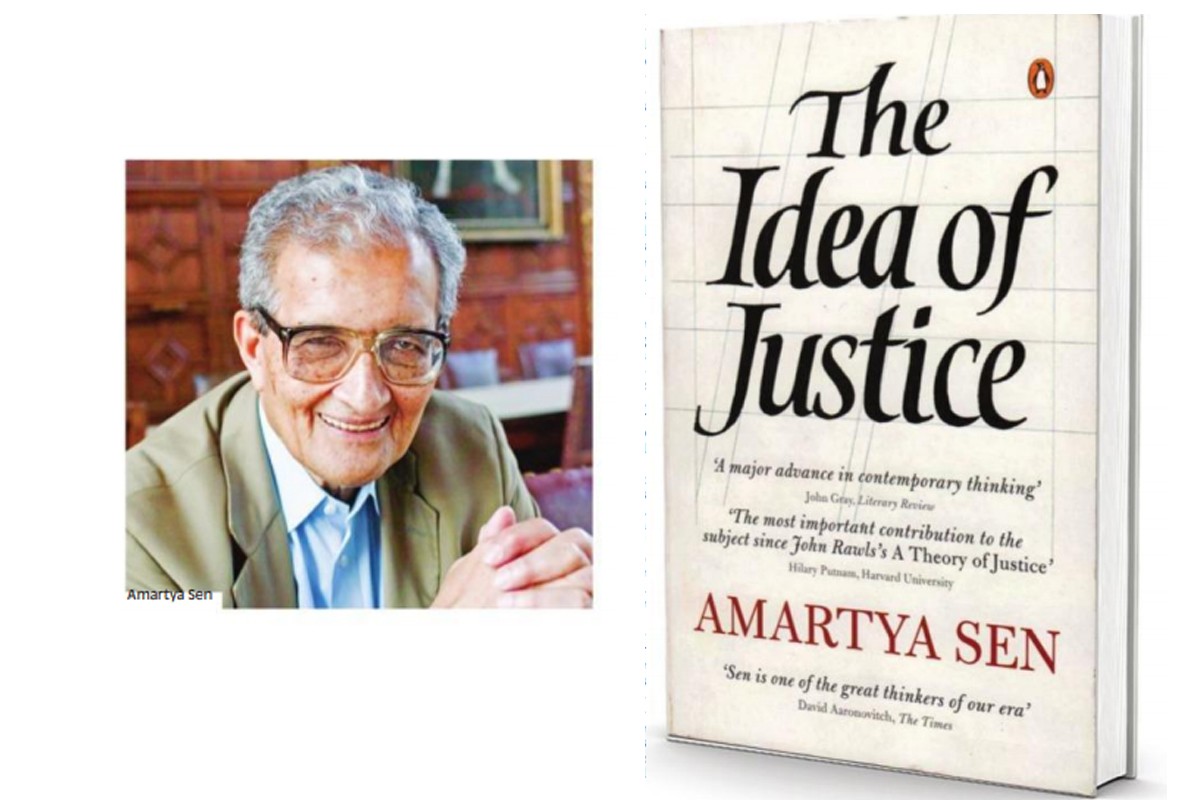Balmiki Pratibha takes the final bow with its 100th act
On Sunday, 17 November, Rabindra Sadan witnessed the 100th and final staging of Balmiki Pratibha, Rabindranath Tagore’s timeless tale of redemption.
Nobel Laureate Amartya Sen, one of the most celebrated economists in the world, pens his thoughts and asks pertinent questions inhis narrative, The Idea of Justice.
Deepak Rikhye | Kolkata | October 24, 2019 3:47 pm

Photo: SNS
Amartya Sen, India’s renowned economist is, as The Times describes him, “One of the great thinkers of our era.” He lives in Cambridge, US near Harvard Square with his wife Emma Rothschild, a historian. At the entrance into their house is a picture of Rabindranath Tagore. Both Sen and Tagore are personalities integral to Bengal’s culture.
Sen was born in 1933 into a Hindu family of academics. He went to Cambridge University to study economics and later to the Delhi School of Economics, The London School of Economics and then to Oxford. He was the master of Trinity College, Cambridge, and for the past 15 years he has been a professor at Harvard University. Through a time-span of six decades, he has enlightened the world on the study of famines and welfare economics. He was also awarded the Nobel Prize in 1998 for his work.
Advertisement
His theory of “capabilities approach” elaborates that countries need to focus on broadbased measures of “human flourishing” and that the essence of this is possible only by eradicating poverty. Accomplishing this task requires a focus on opportunities and distribution of resources. He correlates these factors with the fact that India suffers from lack of gender parity and welfare expenditure.
Advertisement
He states that the previous and present governments in India “have taken a quantum jump in the wrong direction on poverty and healthcare.” In many rural areas, people living below the poverty line may not find a state-run dispensary nearby and are compelled to undergo treatment in the more expensive privately-run hospitals.
When Sen was nominated for a second term as chancellor in the historic Nalanda University, he withdrew his nomination since the government expressed its “displeasure,” the US publication The New Yorker reported.
Sen is 85 years old, and is described as a man with a “boisterous laugh” and an amazing memory of personalities. He still writes and is currently working on a memoir, which, he says, makes him feel “ancient.” He reflects on Trinity College, describing it as “a great mathematics college,” which had on its rolls luminaries like Isaac Newton.
Sen reminisces that at one point of time, India had a Sikh leader who was an economist, and a Muslim President. But now he reminds people that the prevailing government appears to be Hindutva-driven only. India, with its diversity of beliefs, needs to be cautious and Sen advises steps to be taken towards the equality of communities.
Several factors, like observations through his experiences, problems being encountered by the poor, lack of gender parity and difficulties related to equality of people with different beliefs, have inspired Sen to write a book on the most critical matter of all: justice.
His narrative, The Idea of Justice, begins with thoughts of Ludwig Wittgenstein, a remarkable philosopher, who wrote in 1921, “What can be said at all can be said clearly; and whereof one cannot speak thereof one must be silent.” Sen explains that Wittgenstein also pondered on the importance of “smarter” leaders and people because smarter individuals have the ability to think more clearly about their goals, objectives and values; this emphasises the power of reasoning. He examines the difference between self-interest and a socially beneficial endeavour.
The importance of the Mughal emperor Akbar is reflected by Sen in the context of harmony in a diverse nation. The emperor engaged in far-reaching scrutiny of social and political values including cultural practices. He paid attention to the challenges of inter-community relations in the 16th century. This verily evokes Akbar’s unusual policies of that period. In his capital, Agra, Akbar initiated dialogues between Hindus, Muslims, Christians, Jains, Parsees and other communities as well. The secular constitution that India adopted in 1949 has many features already adhered to by Akbar in the 1590s. This reflects Wittgenstein’s advice that clarity of thought results in silence when criticism is eliminated.
Sen clarifies with remarkable wisdom that notwithstanding governments, people, too, can share a common bond of values which is all about basic human abilities: to understand, sympathise and argue; in other words, people do not need to be inevitably doomed to isolated lives.
He asks a pertinent question: do we not have enough forms of deprivation, like hunger, poverty and lack of education among various communities?
India’s literacy rate is 74.04 percent, with Bihar being the least literate at 63.82 percent. In contrast, China’s literacy rate is 96.40 percent.
With the engagement of theories of justice, it is possible for all categories of people to live more fulfilling lives. Sen sheds light on the strength of education which weaves around a content life and must never be ignored. “Education transforms people. It makes a dramatic difference. It generates social equity that we need.”
Advertisement
On Sunday, 17 November, Rabindra Sadan witnessed the 100th and final staging of Balmiki Pratibha, Rabindranath Tagore’s timeless tale of redemption.
Former Asansol Municipal Corporation (AMC) mayor and now BJP leader, Jitendra Tiwari has said that if the host Kapil Sharma does not issue an unconditional apology for showing disrespect to Kavi Guru Rabindranath Tagore then he will move court.
In an address at the State Department's Diwali reception, US Secretary of State Antony Blinken emphasised the significance of the festival and reflected on the tradition's decade-long history at the State Department, which began under Secretary John Kerry.
Advertisement
